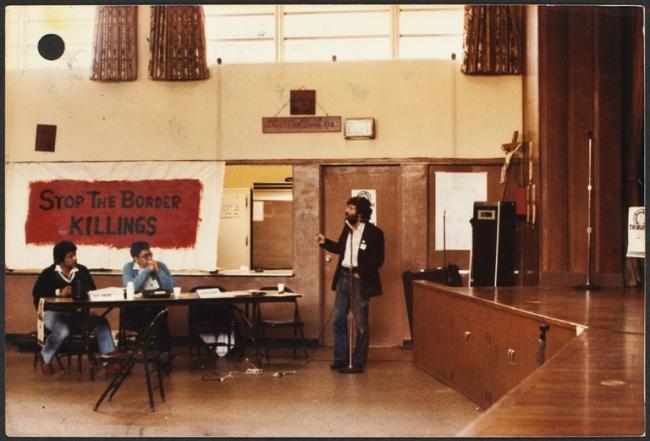
Community members presenting testimony at the Chicano National Immigration Tribunal. (Photo courtesy of the Herman Baca Papers at the University of California San Diego Special Collections and Archives)
This December, we are asking readers to make a tax-deductible contribution before the year is over to ensure NACLA continues to provide only the best in progressive news and analysis on Latin America. Visit nacla.org/donate
In February 1980, Herman Baca, a Chicano activist from San Diego, wrote a letter to President Jimmy Carter demanding he put an end to “border madness.” In the letter Baca detailed how officials from the Immigration and Naturalization Service (INS) were detaining Mexican migrant children in local jails and immigration facilities. In particular, he denounced the detention of a 12-month-old baby as “barbaric” and “inhumane.” While Baca urged Carter to enter into discussion with policymakers, he believed that ultimately the detention of migrant children would only end with the abolition of the INS.
Continuing this activism, in 1981, Baca organized the first community-based call for the abolition of the INS. The call cited the detention of migrant children as an example of the abuse the organization would never cease committing. Such abolition advocacy, which is captured in Baca’s papers held at the University of California San Diego Special Collections and Archives, shows that the movement to abolish institutions of immigration policing did not emerge recently in the face of the Trump administration’s “zero tolerance” policy. While scholars have grounded the movement to abolish Immigrations and Customs Enforcement (ICE) in the ideological history of abolitionism, most have focused on prison abolitionism, overlooking previous movements to eliminate immigration policing. A closer look at Chicano activism in the late 1970s and early 1980s shows that immigration police have long targeted migrant children and that activists have been denouncing related violence for decades. Recognizing that the fight to abolish immigration policing is not new helps to better imagine a just world without immigration policing.












